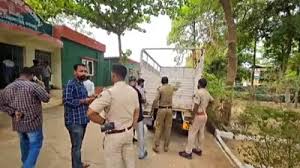The Bharat cancer genome atlas was introduced Monday by the Indian Institute of Technology (IIT) Madras in an effort to advance research and customize care for the fatal illness in India and around the world.
In 2020, IIT Madras launched the Cancer Genome Program. As part of this effort, tissue samples were gathered from all over the nation, and 960 samples from 480 patients with breast cancer have undergone whole exome sequencing.
Researchers and clinicians in India and overseas can now access this database publicly at bcga.iitm.ac.in, thanks to the institute's efforts. We hope that this data on cancer will shed light on the causes of this fatal illness and aid in its prevention through early interventions. According to Prof. V. Kamakoti, Director of IIT Madras, "The Atlas bridges the gap in the genomic landscape from various cancers in the country."
Additionally, Prof. Kamakoti declared that the Indian breast cancer genome sequence was finished.
"To categorize genetic variants involved in early diagnostics, disease progression, and treatment outcomes, it offers a compilation of variants representing the current Indian breast cancer population," he continued.
IIT Madras conducted data analysis and created an anonymized summary of genetic variants from Indian breast cancer samples in partnership with Karkinos Healthcare, Mumbai, the Chennai Breast Clinic, and the Cancer Research and Relief Trust, Chennai.
Cancer is one of the deadliest diseases in the world, and a recent study by the Indian Council of Medical Research (ICMR) showed that the number of people with this deadly illness is still rising in India.
The National Cancer Registry Programme reported that one in nine people in India are likely to develop cancer in their lifetime and 14,61,427 people were currently living with cancer.
There is a 12.8 per cent increase in cancer incidence every year since 2022. Despite having a high cancer incidence, India has been under-represented in global cancer genome studies.
In the absence of genomic architecture of cancers prevalent in India, specific genetic variants from Indian cancers are not adequately captured and catalogued for any diagnostic kits and drug development.
“The new database will be an invaluable resource to identify cancer-specific biomarkers in India, which will enable early detection of breast cancers. Further, it will also be very useful to identify novel drug targets for developing better treatment strategies specific to the Indian population,” said Project Coordinator Prof. S. Mahalingam, Head, Centre of Excellence on Cancer Genomics and Molecular Therapeutics, IIT Madras.
"The data will be utilised towards identifying biomarkers to identify high-risk groups, monitor cancer progression, design strategies for personalised treatment and understand treatment outcomes,” he added.

.jpg)
.jpg)
.jpg)
.jpg)
.jpg)

.jpg)